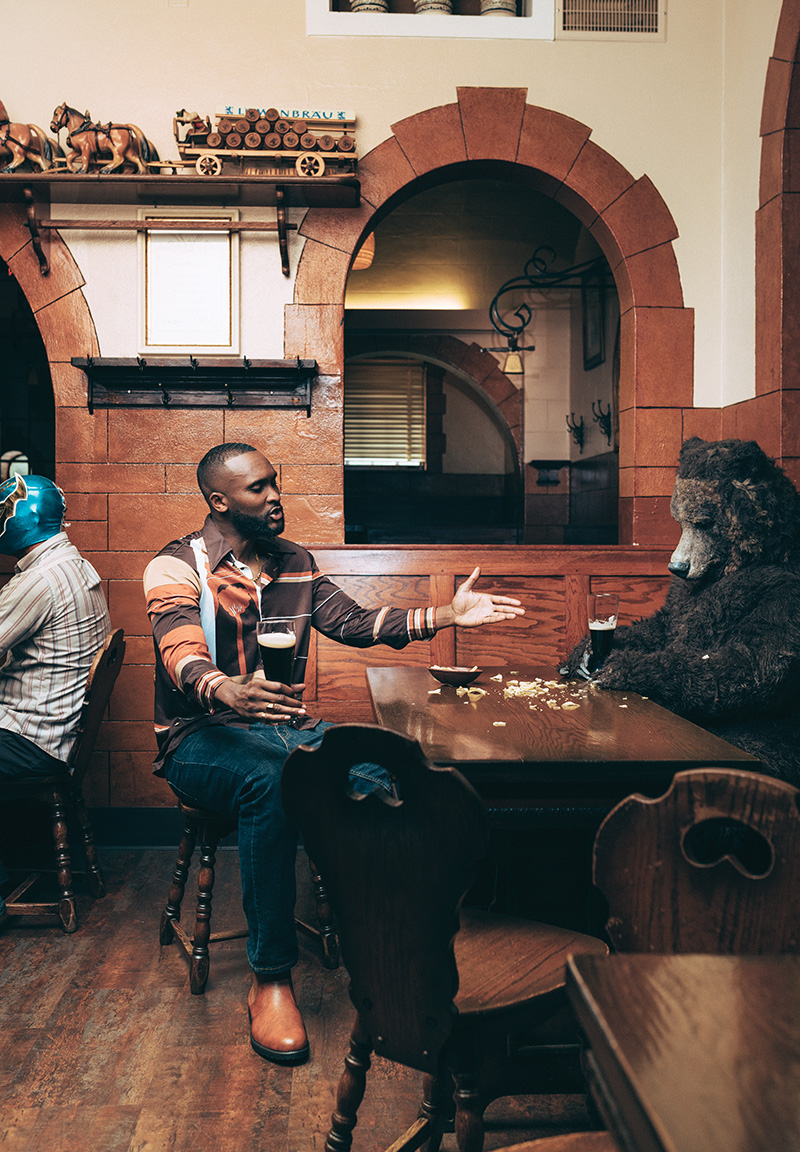
& Josh Scott
Watching Josh Adams is like watching a jazz musician perform. There are melodies you’ll recognize — the setup, the punch line. But he’s always adding new notes to premises you’ve heard before, commanding the full attention of the room as he finds new rhythms and patterns to play off.
And like a great musician, he rarely misses a beat.
“I mean, I’ve heard I’m a natural,” says Adams, a 37-year-old Oak Park native who has been performing stand-up comedy for more than 16 years. “It’s just a lot of improvising, which I’m embracing more. My sets go better if I bring the crowd into it and seize the moment and weave my material into that.”
Adams is more likely to draw from hip-hop and comic book movies to describe himself. “It’s like Stan Lee and the rapper Pimp C,” he says, name-dropping the godfather of Marvel Comics and half of the legendary Houston rap duo UGK. “I fall in between those two, if I had to describe my voice as far as comedy goes.”
A thread of improvisation is woven throughout Adams’ comedy career, too. When he started back in 2006, he says, the local comedy scene was largely segregated. And in many ways, the racial split of audiences still exists today.
“I had to find all these different rooms with all these different vibes,” says Adams, who has performed everywhere from parking lots to poetry nights to venues as big as theaters. “Mainstream” rooms like Mark Ridley’s Comedy Castle in Royal Oak primarily cater to white suburban audiences, he says, while “urban” rooms — with bars such as Bert’s Warehouse in Eastern Market and Baker’s Keyboard Lounge on Livernois Avenue in Detroit hosting comedy nights — cater to Black audiences.
Hour Detroit: What makes the Detroit comedy scene stand out?
Josh Adams: “The special thing about the Detroit comedy scene is that there wasn’t one. It’s just starting to get recognized as a place where funny comedians come from. Comedy has a voice here, and we’re the pioneers of it. It’s a hard place to make people laugh. It’s a lot of blue-collar workers here. There’s so much rich culture that makes us who we are. Everyone here is one of one. What’s making us special is that there are a bunch of strong, unique voices coming out of this place.”
Adams recalls the whiplash he’d feel when performing at Baker’s, a primarily Black room, before crossing Eight Mile to perform at the now-closed Club Bart, a primarily white room, in Ferndale. The venues are just 2 miles apart, but the racial gap felt a lot wider to Adams.
“Think about how close those places are, but they are light years away. It’s two different worlds,” says Adams, who has funneled the experiences of playing to disparate crowds into a stronger act and a firmer sense of self on stage.
“I found ways to be me so it works wherever I’m at,” he says. “I don’t have to compromise who I am by going someplace, like acting a different way in a white room or acting a different way when I’m in the hood spot or the poetry spot.”
In a lot of ways, Adams’ rising star has a gravitational pull strong enough to overcome any divides in metro Detroit’s comedy universe. He’s built a fan base in both worlds, drawing fans to venues they might never have gone to before. And that trust he’s built with his audience is something this young king of Detroit comedy takes seriously. He’s pulled praise from every room he’s worked, regardless of who was sitting in the audience.
“They were just telling me, ‘We believe in you. If you see yourself half as much as we see you, you’re gonna be as big as you need to be,’” he says of his supporters. “I’m just moving forward because I don’t want to make liars out of them. I want to prove what they said is true.”
This story is featured in the September 2021 issue of Hour Detroit magazine. Read more stories in our digital edition.
|
|
|









